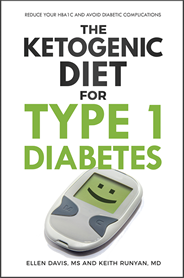Breaking a Weight Loss Plateau

I know all about how annoying a low carb diet weight loss plateau can be.
In 2008, I began to change my eating habits in order to address some serious health problems. I also wanted to lose the excess weight I had accumulated over the years while eating a poor diet full of processed junk food. It took several years to achieve small victories. I still struggle with my weight, but I figure I'm a work in progress.
The Most Common Causes of a Weight Loss Plateau
Here is my opinion, born of my individual experience, on the most common causes of a weight loss plateau. If you are following a ketogenic diet, and not losing weight, or the weight loss is inconsistent (going down one week and up the next), here are some of the most common causes:
- Eating more carbohydrate than you think (fruit, nuts, and yogurt are the particular culprits here). I call this carb creep.
- Not eating enough protein. A quick look at the newer studies on protein intake on a low carb diet are indicating that ramping up fat intake at the expense of protein is not productive for weight loss. See Marty Kendall or Ted Naiman's work.
- Eating more calories than your body can handle without storing (this is usually the result of a very high fat intake - for me, too much dairy). You want to be burning your stored fat, not excess fat from your diet.
- Eating lots of coconut, coconut oil or MCT oil. Coconut oil has a lot of medium chain triglycerides in it. This type of fat can't be stored, so your body has to burn it first. Again, the goal is to burn your stored fat, not fat from your diet.
- Not exercising in a way that increases insulin sensitivity to the muscles. (The problem is that for people with a broken metabolism, long, slow exercise doesn't work well - it has to be high intensity exercise, which uses all the glycogen stored in the muscles, and makes them more insulin sensitive. This would be once or twice a week bouts of heavy weight lifting, sprints, etc. Not every day walking on a treadmill.)
- Thyroid issues: Amy Berger's book The Stall Slayer is an excellent source for learning how to address this issue, and she discusses some other common weight loss issues as well. Highly recommended.
In addition, these issues can also be at work, alone or in combination:
- There's a food sensitivity which is not being addressed. For instance, many people find that dairy products stall weight loss, or perhaps gluten in some form is being eaten (low carb pasta, protein bars or some other processed low carb food). Some people find that nightshade vegetables like tomatoes are a problem.
- A very broken metabolism. It will take time, and a commitment to do whatever it takes to fix the metabolic issues, especially when it comes to improving insulin sensitivity. This includes keeping the amount of carbohydrate consumed very low (I have to stay below 16 grams of carb per day to maximize weight loss), and avoiding foods and other substances which are known to spike insulin without necessarily increasing blood sugar. These include gluten, aspirin, non steroidal anti-inflammatory drugs, casein protein from dairy products and MCT oil.
- Not being consistent on the program. Consistency over time is key, because it takes about 1-2 weeks to get into ketosis. If you kick yourself out with a cheat day, it will take that long to get back into ketosis. Now, at that point, a good chunk of time has passed where no fat burning was occurring. If you are weighing yourself once a week, this can be disheartening, as that cheat day will have put 4 pounds of water back on, and it will be another 3-4 days before weight loss starts again. What seems like a weight loss plateau is really just a delay because of the time it takes to get back to ketosis.
- Accountability is lacking. Consistency, I think, is helped if you have a way to be accountable to someone, and you track your food intake and results each day to help you stay on course. it's a pain, but at least at first, it helps to measure and track everything, (food intake, exercise, blood sugars) in a program like Cronometer or on an Excel spreadsheet. If you don't do this, it is just too easy to let the carbs and calories creep up. It's a pain, but if you really want to make your weight goal, I think it's necessary to record what you are eating, and use this information to stay on plan.
- Be aware of the markers you are using to chart your progress. I personally think that weight scales are the devil. Using the scale as a marker is a daily crap shoot, because there are so many variables over which you have no control involved. Are you dehydrated, did you exercise, is gluconeogenesis kicking your blood sugar up, are you retaining water because of hormone fluctuations? These are all factors which are outside of your control, and using the scale as a marker will be a daily frustration. However, if you set a calorie limit or some other goal over which you have total control, frustration levels drop and weight loss plateaus are less psychologically battering.
- Sometimes, the body may just be adjusting itself after a period of intense weight loss. I've read in several articles that the body will replace lost fat with water, as it adjusts to weight loss. Then all of sudden, it will release the extra water, and the dieter will experience a "whoosh" in weight loss - say 5 pounds in two days.
- Paradoxically, you may not be eating ENOUGH calories or you are exercising too much. The body slows down its metabolism in response to a lack of food or excessive amounts of exercise. Dr. Steve Phinney did a study in 1988 which showed that when people exercised more than an hour a day, their resting metabolic rate dropped by as much as 15%. There are at least two other papers which report the same outcome to a regimen of excessive exercise.This doesn't seem to fit the logic of breaking a weight loss plateau, but you could try adding 300-500 calories of fat and protein to your daily count for a few days, and see what happens. And if you are exercising hard every day, reduce the amount of time you spend exercising and give yourself permission to rest a day or two during the week.
- You may be eating too often. Try going for longer periods without eating. This "intermittent fasting" (IF) works well for some people, as it allows the blood sugar and insulin to return to baseline levels before the next meal. For instance, instead of having 5 small meals a day spaced out over 8-10 hours, have most of your calories in a 6 hour window, say from noon until 6pm, and then don't eat again until the next day at noon. Marty Kendall's Data Driven Fasting is good program to follow for IF. Jason Fung's Fasting book is a good resource too.
- There may be a lack of a micronutrient, especially if you aren't taking any supplements. Try taking a balanced multivitamin once a day. Have your vitamin D levels checked and bring them up if they are low.
- Finally, and this is most important, the success of losing weight and improving health is about learning new habits and sticking with them. If you decide that your new eating habits are a permanent change, it makes it easier to weather the occasional weight loss plateau. I know that if I were to go back to eating my "old" way of eating, I would gain weight and my old symptoms return. After all the work I've done to fix my broken metabolism, it's just not a smart thing to do. But being smart all the time isn't likely either. Backslides will happen. They have happened to me, and they can happen to anyone. Just take them in stride as part of the journey and do better next time. : ) You might even check out a hypnotherapy program if you are still having trouble losing weight. There's a nice website here which talks about using hypnosis for weight loss.
If you are experiencing a weight loss plateau, just hang in there. Honestly evaluate your diet and exercise program, tweak where you can, and try to wait it out.
All of my books are available in electronic PDF, and now in paperback on Amazon!
 |
 |
 |
|
Buy paperbook on Buy paperback on Amazon Buy the e-Book via Paypal |
Buy paperback on Buy paperback on Amazon Buy the e-Book via Paypal |
Buy paperback on Buy paperback on Amazon Buy the e-Book via PayPal |
Done with Weight Loss Plateau, back to Home
Back to Best Way to Lose Weight